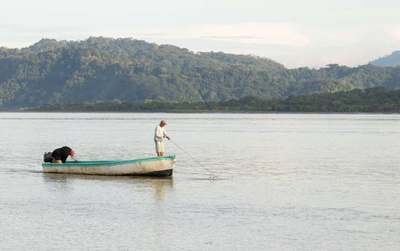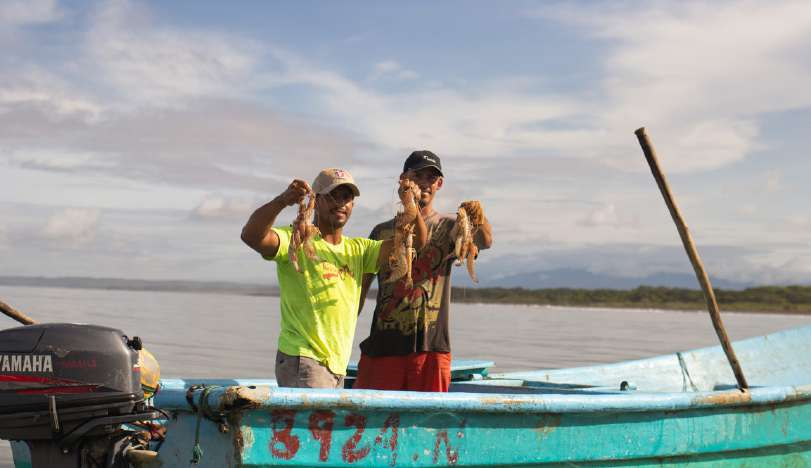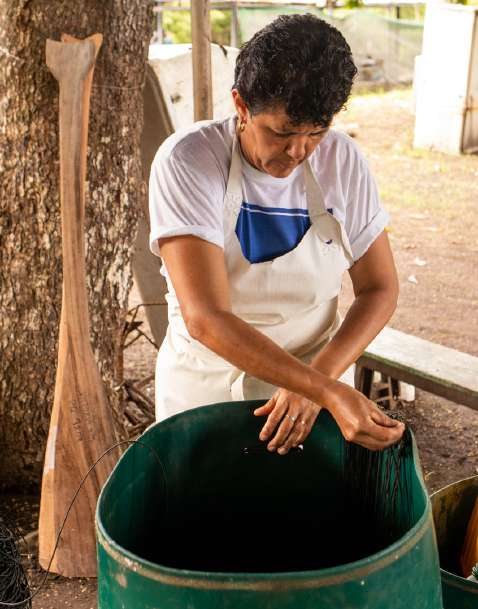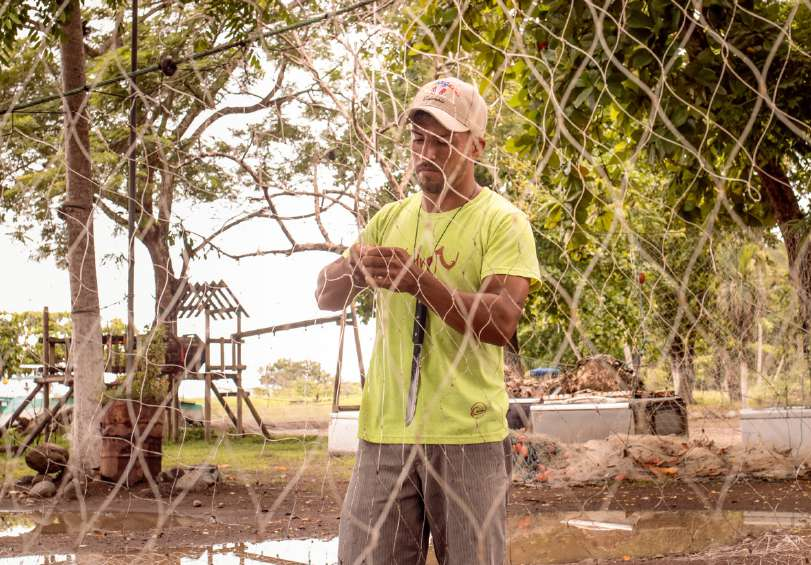| Authors | Marvin Fonseca, Vivienne Solis Rivera, and Upamanyu Das |
|---|---|
| Topics | Biodiversity, Climate change |
| Case Report | Volume 1: "Resilience in the Face of COVID-19" |
Brief description
Costa Rica is a Central American country with a unique geographical position between two continents and extended territorial waters. Only one-tenth of the national territory is land. As a result, fishing and harvesting coastal products are important activities in the country—both at the national level as an industry-intensive sector and at the local level for supporting local economies and providing food security to communities (CoopeSoliDar R.L., 2020).
According to Solórzano-Chavez et. al. (2017), while men tend to predominate fishing and harvesting, women play important roles in the diverse value chains of fish products. Fishing, therefore, is "not just a simple economic activity, but rather a complex social and cultural dynamic that influences the quality of life of men and women fishers, the satisfaction of their families’ needs, and the integrity of their communities" (Solórzano-Chavez et. al., 2017). It is a way of life.
However, the highly aggressive neoliberal market in Costa Rica inhibits the possibility of small-scale fisheries to place their products at important markets. It also diminishes the possibility of approaching the market from the diversity of territories of the sea. Even though Costa Rica has two coasts with relatively easy access, the country has not been able to develop a significant urban consumption of seafood. Additionally, the traditional seafood market has seen reducing access to only a few products. Due to the neoliberal market, the import of seafood from other countries—many of these products coming from aquaculture production at very low prices—has also affected the purchase of national products.
As stated by CoopeSoliDar R.L. 2020, it is important to note that, although social development, employment, and decent work are recognised as fundamental for all citizens within the country’s constitution, Costa Rica is yet to recognise these rights for the majority of small-scale artisanal fishers. According to international studies, the country has about 15,000 artisanal fishing families, but only 2,000 are formally recognised and issued licenses by the State. For the fisherfolk, this makes equal access to social and economic services null in contrast to other Costa Ricans who have developed various types of productive activities. Therefore, most small-scale artisanal fishers women and men operate informally in vulnerable conditions with many of them living below the poverty line.
Process that led to the community being resilient (Pre-covid)
In 2004, the idea of developing a network of small-scale fishing communities was born with three major objectives: To provide a legitimate voice for the sector in national and Central American discussions, to initiate a conscious and continuous effort towards responsible fishing, and to promote the wellbeing of small-scale fishing and marine communities.
Since then, two organisations, namely, CoopeSoliDar R.L. and the Marine Responsible Fishing Areas and Marine Territories of Life Network have participated in actions aimed at strengthening the capacities of fisherfolk, mollusks-gatherers, and their organisations within a framework of human rights, equity, and participatory governance.
The Marine Responsible Fishing Areas and Marine Territories of Life Network is a conglomerate of organisations containing diverse fishing organisations, communities of marine management areas, indigenous groups, afro-descendants, and mollusks-gathering communities, among other forms of fishing and community organisations. Thus, it is a broad, open, and heterogeneous group. Currently, the Network integrates 22 Marine Territories of Life[1].
As an organisation providing technical support, CoopeSoliDar R.L. has used different actions, strategies, and methodological instruments—in conjunction with the Marine Responsible Fishing Areas and Marine Territories of Life Network—for the recognition of rights of artisanal fishers and mollusk-gatherers in the environmental, economic, social, and legal context of Costa Rica. The work done by these organisations has been essential to maintain the vitality and resilience of the sector—reducing poverty and ensuring food security.
How resilience that was established has helped during the pandemic
As a response to the commercial and social impacts of the COVID-19 pandemic on small-scale artisanal fisheries of Costa Rica, CoopeSoliDar R.L. put to work a Solidarity Fund created from the resources of its associates. This has been used for fair and equitable marketing of seafood bought from small-scale fishing communities that have been affected by COVID-19.
The funds are meant to help communities that have been heavily impacted by the lack of tourism and the inability to access markets. The funds are utilised for travelling to many territories and buying marine products at fair prices. Artisanal fishing organisations are contacted directly in each territory to promote collective action and well-being. The fisherfolk are consulted on the type of product and the fair price for their products. A process has been initiated through which social networks are being facilitated to create a new market of solidarity and support for families who depend on the sea. These communities have been using their traditional knowledge systems for generating dignified livelihoods and ensuring food security, not only for themselves, but also for thousands of other Costa Ricans who live in urban areas.
After eight months of the Solidarity Fund being put in place, another process was initiated by CoopeSoliDar R.L. and the Marine Responsible Fishing Areas and Marine Territories of Life Network towards creating the Sea Market. This is a fair and equitable solidarity market that provides decent sustenance to small-scale artisanal fishers and promotes sustainable ways of life. An ethical protocol has been co-developed for the operation of this market, which establishes consultative processes and ensures that the benefits derived from this market are fairly distributed among all stakeholders in the territories. The marketing is based on the principle of solidarity, respect for diversity, gender equity, and the just and equitable distribution of benefits, recognising all levels of participation along the value chains of the different products. There is a clear objective from the beginning to properly recognise and value the contribution of women within fisheries, market value chains and this specific market initiative too.
In addition to the above, the strengthening of the Sea Market will contribute significantly to the efforts promoted by the Marine Responsible Fishing Areas and Marine Territories of Life Network and CoopeSoliDar R.L. aimed at regularising and defending the rights of small-scale artisanal fishing—proposed under the 12 Paddle model which intends to solve the problem of access to rights suffered by many families engaged in small-scale artisanal fishing in Costa Rica. The 12 Paddle model is a process through which small-scale fishing communities can advance towards better conditions of life and recognition of their rights. Each paddle has its own criteria including issues such as level of fishers’ organisation, responsible fishing etc. The communities will be supported to strengthen their capacities and maintain their rights to fish in the long term.
Lessons learnt
Costa Rica concentrates its population in the urban areas of the country and there is little awareness of the cultures, identities, and products of coastal areas. The Sea Market has managed to identify an important group of people who are willing to consume products from coastal communities and interested in the social, cultural, and product quality aspects that are unique to this market.
Although women have been barely studied or recognised, they continue to play a fundamental role pre-fishing and post-fishing, and they are the strongest channels that have been identified in the diverse fisheries value chain. From this experience, it seems that recognising women for their work also translates into a greater push for collective action over individual action, and therefore, is key for equitable distribution of benefits.
The work carried out on conservation, promoting local knowledge, creating livelihood security and strengthening the capacities of these marine-coastal communities has helped them strengthen their environmental and social resilience. It has provided them the possibility of coping with the difficult situation of COVID-19 in innovative and radical ways.
External references
CoopeSoliDar R.L ( 2020). "Status of Social development of small-scale fishing communities: Costa Rica." CoopeSoliDar R.L.
Solórzano-Chavez, E. et. al., (2017). "Decent rural employment in small-scale and semi-industrial fishing sectors in Costa Rica." Food and Agriculture Organisation of the United Nations.
CoopeSoliDar R.L. (2021). "Los Doce Remos: Una pesca responsable asegura la sostenibilidad ambiental, social, económica y cultural de los pueblos marino-costeros." CoopeSoliDar R.L.
Notes
- ↑ A Marine territory of life is an area where there exists a close and deep connection between the marine territory and an indigenous people or local community. The custodian people (or community) makes and enforces rules and decisions about the marine territory through a functioning governance institution. And, the governance decisions and management efforts of the concerned people or community contribute to the conservation of nature as well as to community wellbeing.



